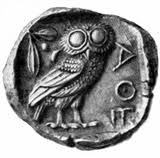Biology
Coined: The ancient Greeks coined the term glaucoma, which they used to describe all eye diseases that lead to blindness. In the first several centuries A.D., cataracts, which can be treated, started to be distinguished from glaucoma, which could not be amended.
- Pyelonephritis
Term: pyelonephritis Literally meaning: ?inflammation of pelvis?Origin: Anc Greek??????/pyelos(=pelvis, basin)??????/nephros(=kidney)-?????/-itida (=-itis, suffix meaning ?pertaining to? or ?inflammation?.) It is feminine gender because it was used with...
- Alopecia
Term: alopeciaLiterally meaning: ?loss of fur? because foxes are less furry when afflicted with a skin disease (the "mange") .Origin: Anc Greek??????/alopix(=fox) > ?/a(=prevative) + lopy/????(=fur) -??/-ia=a formative ending used in Greek naming nouns...
- -oma
Term:-oma (plural ?omas but according Greek plural ????? ?the plural type of -omata is more correct) Origin: Anc Greek ????/oma (=suffix meaning "complete set of" or a condition eg disease condition ) DefinitionNoun suffix...
- Atheroma
Term: atheroma Origin: ?????/?????/atheri(=groats, or porridge) + -oma (-noun suffix used usually to form names of tumors or to denote marked growth). The term derived by the sense of the fatty depost in the inner lining of the artery like an encysted...
- Eye Facts
We should never put anything in or near our eyes, unless we have a reason to use eye drops. We would only do that if our doctor or parent told us to use them.Blinking helps to wash tears over our eyeballs. That keeps them clean and moist. Also,...
Biology
glaucoma
Term: glaucoma
Origin: An Greek ???????/glaucos(=bluish-green, gray) + ???/oma (=noun suffix used to denote "marked growth). The Greek word for owl was also ?????/glaux.
 |
| ancient coin from Athens |
Definition: A group of eye disease which is the result of optic nerve damage leading to permanent and progressive vision loss or blindness. Glaucoma is due mainly to increases eye pressure.
- Pyelonephritis
Term: pyelonephritis Literally meaning: ?inflammation of pelvis?Origin: Anc Greek??????/pyelos(=pelvis, basin)??????/nephros(=kidney)-?????/-itida (=-itis, suffix meaning ?pertaining to? or ?inflammation?.) It is feminine gender because it was used with...
- Alopecia
Term: alopeciaLiterally meaning: ?loss of fur? because foxes are less furry when afflicted with a skin disease (the "mange") .Origin: Anc Greek??????/alopix(=fox) > ?/a(=prevative) + lopy/????(=fur) -??/-ia=a formative ending used in Greek naming nouns...
- -oma
Term:-oma (plural ?omas but according Greek plural ????? ?the plural type of -omata is more correct) Origin: Anc Greek ????/oma (=suffix meaning "complete set of" or a condition eg disease condition ) DefinitionNoun suffix...
- Atheroma
Term: atheroma Origin: ?????/?????/atheri(=groats, or porridge) + -oma (-noun suffix used usually to form names of tumors or to denote marked growth). The term derived by the sense of the fatty depost in the inner lining of the artery like an encysted...
- Eye Facts
We should never put anything in or near our eyes, unless we have a reason to use eye drops. We would only do that if our doctor or parent told us to use them.Blinking helps to wash tears over our eyeballs. That keeps them clean and moist. Also,...
